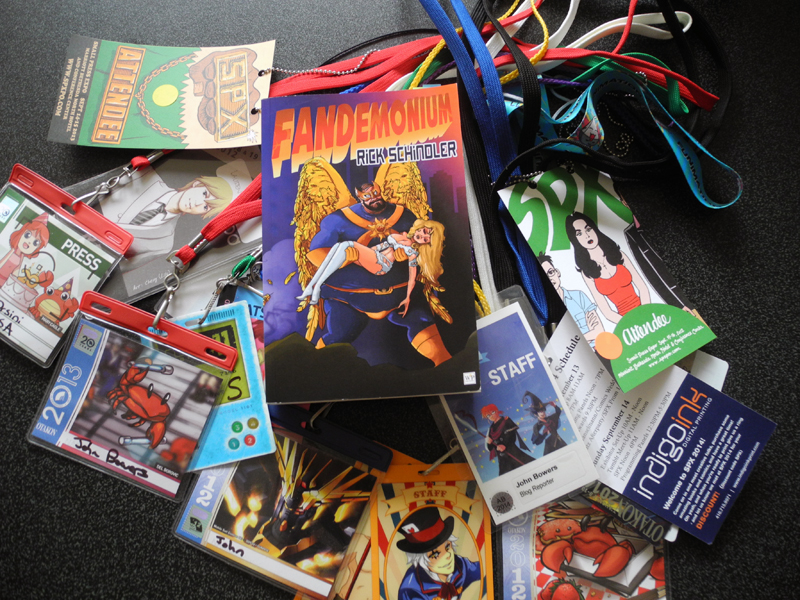My first ever fandom convention was Otakon 2006. That was eight years ago, but it’s stunning how little has changed. Check out these Otakon 2006 cosplays—would any of these look out of place on the convention floor today?
I don’t often take part in debates about how conventions have changed since the beginning of my involvement, because for me they really haven’t. From my 27-year-old perspective, anime conventions have always included video game, comics, and pop culture elements.
Now I have an inkling that the convergence of fan culture has been an active force since long before my fandom lifespan. I read about it in a book of course, because it’s always books that take our niggling thoughts and assure us that we’re not alone.
Take this birds-eye-view of the book’s fictional 1993 fandom convention:
“For Fandemonium was a city, he saw now, and here was its Times Square. Just like in New York, people who looked like they didn’t even belong on the same planet were all jumbled together: Star Station Sigma aliens from a dozen different galaxies; role-play gamers with plumed helmets and crested shields; anime girls wearing pigtails and fairy wings; funny-animal lovers in feathers and fur; fat fanboys whose bags bulged with comics; moms and dads with squealing little kids; and tons of teenage boys whose T-shirts proclaimed why they were here, from trading cards to video games to Japanese manga to science fiction to sword and sorcery to superheroes to a million other weird and wonderful things.”
Rick Schindler’s Fandemonium is a 400-page saga that takes place in the brief weekend of its eponymous event, seen from the alternate perspectives of a depressed but legendary comics writer; a tortured, gay comics mogul; an impulsive, ambitious science fiction show actress; a Jamaican drug dealer; and a bright but bullied 12-year-old fan. Schindler’s ability to get into the minds of such a diverse cast is vital to cover something as wide-ranging as a con.
I requested a review copy of Fandemonium after I saw my editor wearing a T-shirt referencing the book—Schindler is a friend of hers. People send me stuff to review from time to time but it’s usually not worth a mention. Fandemonium, however, I devoured in three days. It may be long, but it switches perspective, and even genre (from review articles, IMDB pages, TV scripts, erotic fanfiction) often enough to stay fresh. I know very little about comics, but a lot about other kinds of fandom, and that was enough to stay afloat and even pick up some of the Easter Egg references tossed in for the fans.
My only issue with it is some of the characters’ heavy reliance on drugs and alcohol seemingly to keep his narrative interesting, which detract from rather than enhance the otherworldliness of the con. Because Schindler’s Fandemonium, as seen through 12-year-old Fred’s eyes, doesn’t need it. It’s everyone’s first convention experience magnified:
“He reeled on his heels at the edge of the convention floor, absorbing another jolt of syncope like the one he’d had gazing up the side of [convention location] Olympia Tower. Just as the security office had seemed too small, the exhibit hall seemed too large. The booths towered over him, the aisles teemed with people, and clamor filled his head. The hall was vast, its ceiling far above, its walls receding in the distance. Where did this room end?”
Fandemonium is my confirmation that conventions have forever been overwhelming hodgepodge expressions of many kinds of fandom love, for decades spanning far longer than my eight years of attendance.
Since Wattle Publishing sent me a physical copy of Fandemonium, I’d like to give it away to a lucky reader. Leave a comment before next Wednesday to enter the raffle.








